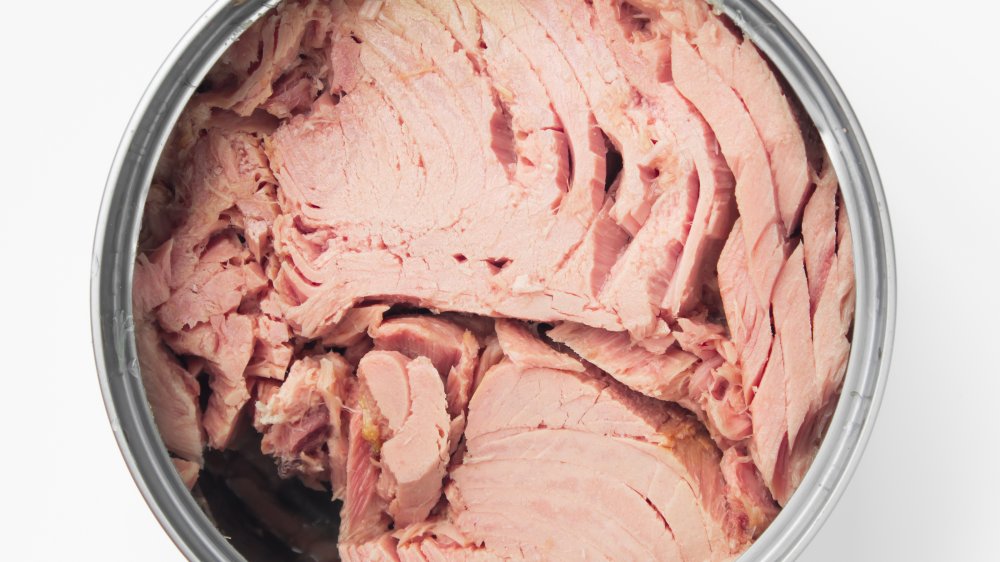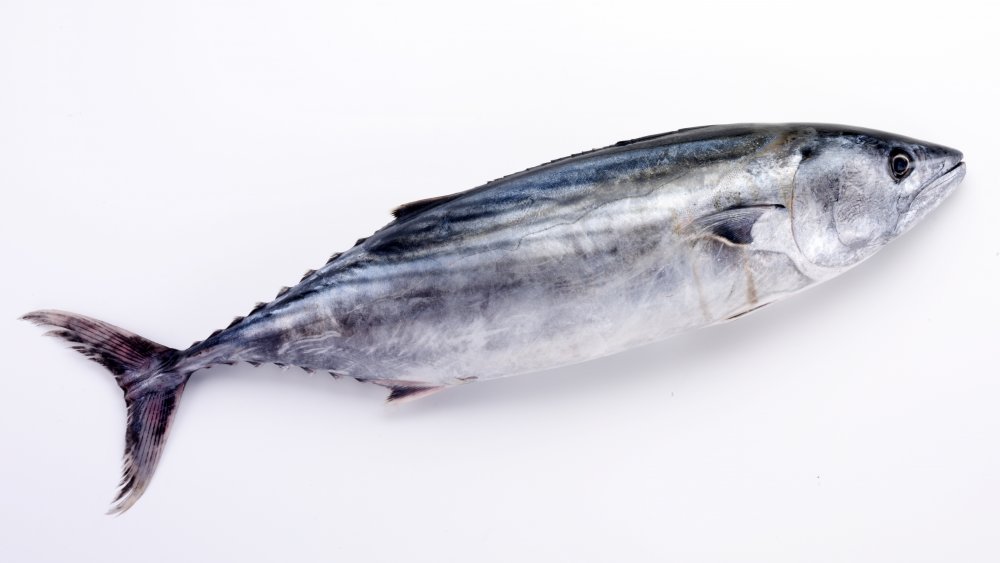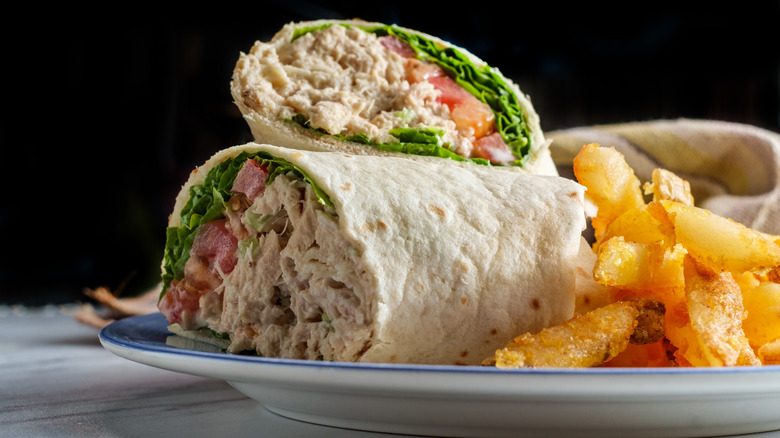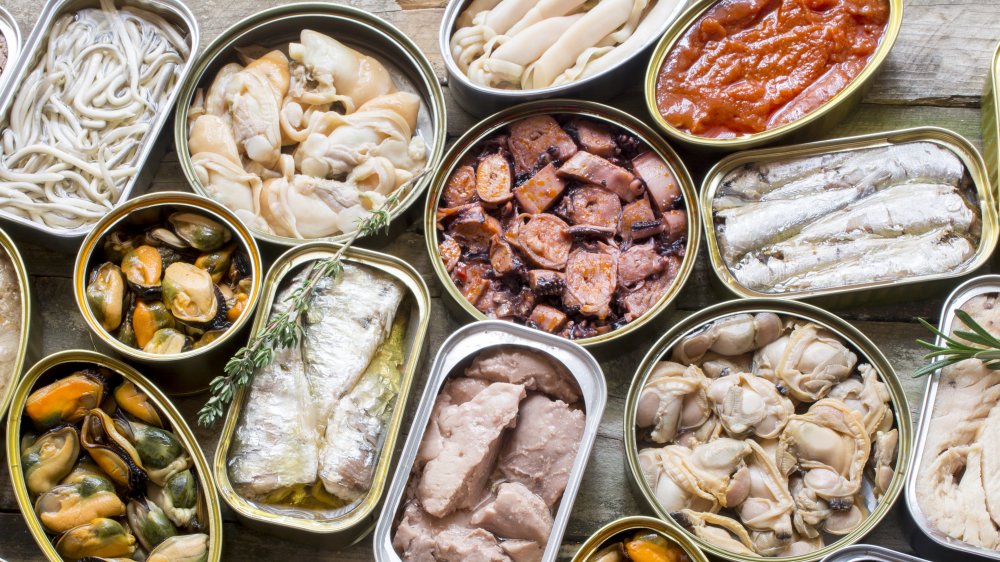The Real Reason You Should Avoid Canned Tuna
A can of tuna checks a lot of boxes on a busy day, when you're in need of sustenance. It's quick, inexpensive, and nutritious, thanks to its low-fat and high-protein content and abundance of omega-3's. Also, let's be honest — buying fresh fish and cooking it can be intimidating. The tin can solves that problem; with a quick flick of a can opener, you're in business.
It's not all smooth sailing for canned tuna fish, though. Sustainability and the potential for supply chain labor misconduct are things to keep in mind when you're making the decision to buy canned tuna. According to Reuters, slavery, trafficking, and labor exploitation are widespread in the fishing industry. The outlet reported in 2019 that tuna fishing is a $42 billion industry. And efforts to vet the labor supply chain are, at times, questionable.
Seafood Watch has launched a Seafood Slavery Risk Tool that helps businesses potentially identify slavery practices among their suppliers. The site is also a resource for consumers seeking brands of sustainably-sourced canned tuna. So, you may want to scan this list the next time you're cruising the canned fish aisle. Or, you can just look for cans that are marked as Marine Stewardship Council certified.
What else to be aware of when buying canned tuna
Another point to consider when whipping up your next tuna casserole is the mercury content. According to Healthline, tuna is relatively high in mercury, compared to other types of fish, and you should be conscious of how much and how often you eat it. Eating fish every day is touted as having many health benefits, from improved cardiovascular health to better sleep. However, too much of certain types of fish can have negative effects on your well-being.
Mercury finds its way into the food chain through water. As a naturally-occurring element in the earth's crust, mercury is released into the atmosphere and then dissolves into seawater (via Live Science). While fish go about their days in the ocean, they ingest mercury which then transfers to us when we eat them. The adverse effects of consuming too much mercury are scary, but enjoying canned tuna in moderate amounts is generally safe.
Health risks of eating canned tuna
In addition to the presence of mercury, there are other red flags to watch out for when it comes to preparing a meal made with a can of tuna, such as the possibility of experiencing a certain type of food poisoning called scombrotoxin. Scombrotoxin happens when a reaction occurs and the tuna starts to go bad, producing a specific type of bacteria to which some people are allergic. The production of this bacteria is caused by "improper handling" and found most prominently in tuna and mackerel.
Symptoms include tasting pepper, sweating, and dizziness. Another concern to be aware of is the potential presence of a chemical called Bisphenol A (aka BPA) sometimes found in cans. While the FDA claims the levels of BPA in cans is not harmful, its potential health effects, including the potential for infertility, cancer, and heart disease are something to consider when eating copious amounts of canned food, per Eat This, Not That!. Additionally, Healthline recommends thoroughly checking cans of tuna before you buy them for dents, holes, or cracks to reduce the likelihood of outside contamination.If you open your can of tuna and find the smell or color isn't quite right, throw it away.
Alternatives to canned tuna
Canned tuna isn't your only option for a quick and easy fish dish. Just like your mom always said, there are other fish in the sea! And some of them even come in cans. Sardines, for example, are notably low in mercury, have a low environmental impact, and are a nutritional powerhouse for your bod, according to Lifehack. Despite their stinky reputation, these shiny-scaled swimmers deserve way more than just a haphazard spot on your pizza. The Kitchn has an entire post's worth of ideas on how they're not just an underrated ingredient, but they're also quite luxurious. Saucy pasta with sardines, anyone?
Perhaps you're more into something less odorous but still impressively healthy. Try salmon! Good Housekeeping suggests selecting canned salmon that is labeled as Alaskan, which assures you it is wild-caught from North American waters and is sustainable. To be fair, sometimes you just can't beat a good tuna salad sandwich. We think the enjoyment and convenience is worth the extra few minutes of contemplation to make sure your canned tuna choice is a smart one.



